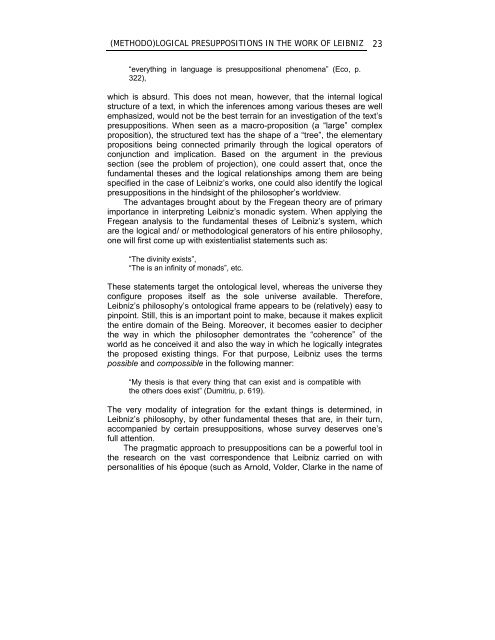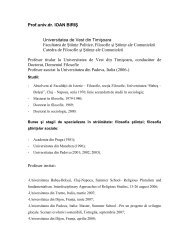analele universităţii de vest din timişoara annales universitatis ...
analele universităţii de vest din timişoara annales universitatis ...
analele universităţii de vest din timişoara annales universitatis ...
Create successful ePaper yourself
Turn your PDF publications into a flip-book with our unique Google optimized e-Paper software.
(METHODO)LOGICAL PRESUPPOSITIONS IN THE WORK OF LEIBNIZ 23<br />
“everything in language is presuppositional phenomena” (Eco, p.<br />
322),<br />
which is absurd. This does not mean, however, that the internal logical<br />
structure of a text, in which the inferences among various theses are well<br />
emphasized, would not be the best terrain for an in<strong>vest</strong>igation of the text’s<br />
presuppositions. When seen as a macro-proposition (a “large” complex<br />
proposition), the structured text has the shape of a “tree”, the elementary<br />
propositions being connected primarily through the logical operators of<br />
conjunction and implication. Based on the argument in the previous<br />
section (see the problem of projection), one could assert that, once the<br />
fundamental theses and the logical relationships among them are being<br />
specified in the case of Leibniz’s works, one could also i<strong>de</strong>ntify the logical<br />
presuppositions in the hindsight of the philosopher’s worldview.<br />
The advantages brought about by the Fregean theory are of primary<br />
importance in interpreting Leibniz’s monadic system. When applying the<br />
Fregean analysis to the fundamental theses of Leibniz’s system, which<br />
are the logical and/ or methodological generators of his entire philosophy,<br />
one will first come up with existentialist statements such as:<br />
“The divinity exists”,<br />
“The is an infinity of monads”, etc.<br />
These statements target the ontological level, whereas the universe they<br />
configure proposes itself as the sole universe available. Therefore,<br />
Leibniz’s philosophy’s ontological frame appears to be (relatively) easy to<br />
pinpoint. Still, this is an important point to make, because it makes explicit<br />
the entire domain of the Being. Moreover, it becomes easier to <strong>de</strong>cipher<br />
the way in which the philosopher <strong>de</strong>montrates the “coherence” of the<br />
world as he conceived it and also the way in which he logically integrates<br />
the proposed existing things. For that purpose, Leibniz uses the terms<br />
possible and compossible in the following manner:<br />
“My thesis is that every thing that can exist and is compatible with<br />
the others does exist” (Dumitriu, p. 619).<br />
The very modality of integration for the extant things is <strong>de</strong>termined, in<br />
Leibniz’s philosophy, by other fundamental theses that are, in their turn,<br />
accompanied by certain presuppositions, whose survey <strong>de</strong>serves one’s<br />
full attention.<br />
The pragmatic approach to presuppositions can be a powerful tool in<br />
the research on the vast correspon<strong>de</strong>nce that Leibniz carried on with<br />
personalities of his époque (such as Arnold, Vol<strong>de</strong>r, Clarke in the name of




